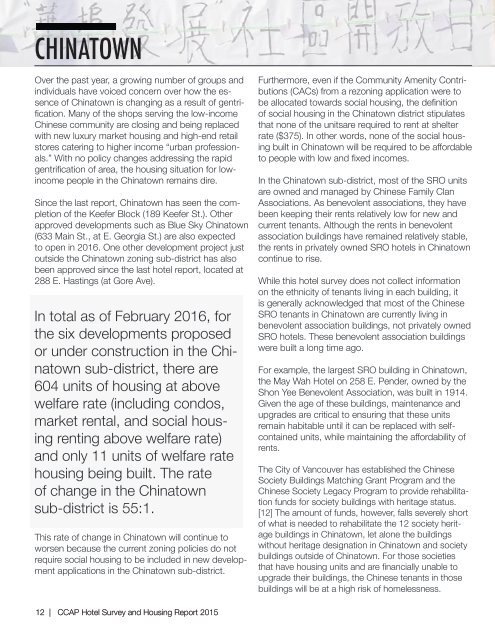Create successful ePaper yourself
Turn your PDF publications into a flip-book with our unique Google optimized e-Paper software.
CHINATOWN<br />
Over the past year, a growing number of groups and<br />
individuals have voiced concern over how the essence<br />
of Chinatown is changing as a result of gentrification.<br />
Many of the shops serving the low-income<br />
Chinese community are closing and being replaced<br />
with new luxury market housing and high-end retail<br />
stores catering to higher income “urban professionals.”<br />
With no policy changes addressing the rapid<br />
gentrification of area, the housing situation for lowincome<br />
people in the Chinatown remains dire.<br />
Since the last report, Chinatown has seen the completion<br />
of the Keefer Block (189 Keefer St.). Other<br />
approved developments such as Blue Sky Chinatown<br />
(633 Main St., at E. Georgia St.) are also expected<br />
to open in 2016. One other development project just<br />
outside the Chinatown zoning sub-district has also<br />
been approved since the last hotel report, located at<br />
288 E. Hastings (at Gore Ave).<br />
In total as of February 2016, for<br />
the six developments proposed<br />
or under construction in the Chinatown<br />
sub-district, there are<br />
604 units of housing at above<br />
welfare rate (including condos,<br />
market rental, and social housing<br />
renting above welfare rate)<br />
and only 11 units of welfare rate<br />
housing being built. The rate<br />
of change in the Chinatown<br />
sub-district is 55:1.<br />
This rate of change in Chinatown will continue to<br />
worsen because the current zoning policies do not<br />
require social housing to be included in new development<br />
applications in the Chinatown sub-district.<br />
Furthermore, even if the Community Amenity Contributions<br />
(CACs) from a rezoning application were to<br />
be allocated towards social housing, the definition<br />
of social housing in the Chinatown district stipulates<br />
that none of the unitsare required to rent at shelter<br />
rate ($375). In other words, none of the social housing<br />
built in Chinatown will be required to be affordable<br />
to people with low and fixed incomes.<br />
In the Chinatown sub-district, most of the SRO units<br />
are owned and managed by Chinese Family Clan<br />
Associations. As benevolent associations, they have<br />
been keeping their rents relatively low for new and<br />
current tenants. Although the rents in benevolent<br />
association buildings have remained relatively stable,<br />
the rents in privately owned SRO hotels in Chinatown<br />
continue to rise.<br />
While this hotel survey does not collect information<br />
on the ethnicity of tenants living in each building, it<br />
is generally acknowledged that most of the Chinese<br />
SRO tenants in Chinatown are currently living in<br />
benevolent association buildings, not privately owned<br />
SRO hotels. These benevolent association buildings<br />
were built a long time ago.<br />
For example, the largest SRO building in Chinatown,<br />
the May Wah Hotel on 258 E. Pender, owned by the<br />
Shon Yee Benevolent Association, was built in 1914.<br />
Given the age of these buildings, maintenance and<br />
upgrades are critical to ensuring that these units<br />
remain habitable until it can be replaced with selfcontained<br />
units, while maintaining the affordability of<br />
rents.<br />
The City of Vancouver has established the Chinese<br />
Society Buildings Matching Grant Program and the<br />
Chinese Society Legacy Program to provide rehabilitation<br />
funds for society buildings with heritage status.<br />
[12] The amount of funds, however, falls severely short<br />
of what is needed to rehabilitate the 12 society heritage<br />
buildings in Chinatown, let alone the buildings<br />
without heritage designation in Chinatown and society<br />
buildings outside of Chinatown. For those societies<br />
that have housing units and are financially unable to<br />
upgrade their buildings, the Chinese tenants in those<br />
buildings will be at a high risk of homelessness.<br />
12 | CCAP Hotel Survey and Housing Report 2015


